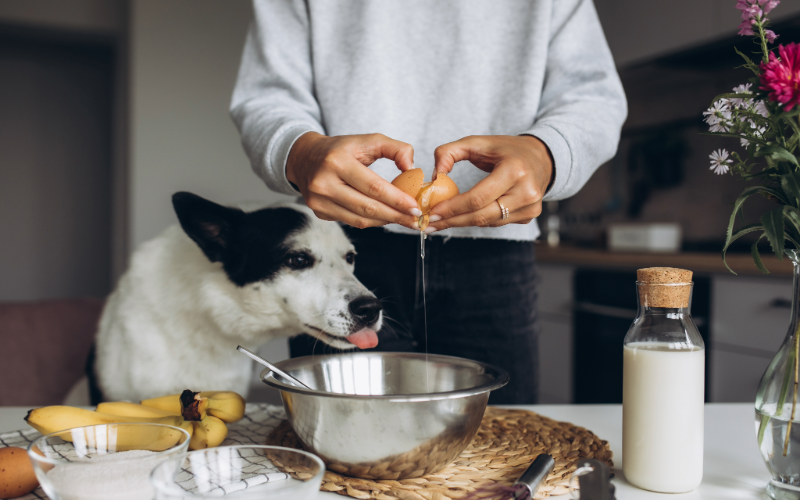Balancing Homemade Diets for Pets: Risks, Benefits, and Guidelines

As pet parents, you are constantly seeking the best ways to nurture and care for your furry companions. One aspect of pet care that has gained traction in recent years is the preparation of homemade pet diets. This trend is fueled by a variety of reasons, ranging from medical necessity to personal preference. In this article, we'll explore the driving factors behind homemade pet diets and weigh the benefits against the challenges.
Necessity vs. Preference
The decision to prepare homemade pet diets can typically be categorized into two main motivations: necessity and preference.
Necessity
Necessity often arises from specific health conditions or dietary requirements of our pets. For instance, in cases of acute gastrointestinal issues like diarrhea, a short-term feeding of a “bland” diet consisting of easily digestible ingredients may be indicated. Pets with chronic health conditions such as food allergies or multiple health problems may require long-term homemade diets to manage their conditions effectively. Additionally, homemade diets are often chosen for pets that have picky eating habits.
Preference
On the other hand, some pet caregivers opt to cook for their pets out of personal preference. This could be due to a desire to mimic their own dietary habits or doubt about commercially prepared pet foods. Others may have philosophical, ethical, or religious beliefs that influence their ingredient choices, sourcing preferences, or food preparation methods.
Benefits of Homemade Diet Feeding
Increased Customizability
One of the primary advantages of homemade pet food is its tailored approach to nutrition, allowing for the accommodation of an individual pet's unique dietary needs or the preferences of the pet parent. This level of control is particularly beneficial for pets with food sensitivities or allergies, as specific food ingredients, additives, or preservatives can be omitted or substituted.
Customizing pet nutrition for animals with multiple health problems is essential because various diseases can involve diverse and potentially conflicting nutritional needs. For instance, pets with kidney disease and pancreatitis might need a diet that limits both protein (or phosphorus derived from protein) and fat intake. However, these macronutrients are crucial for providing energy and enhancing palatability. Therefore, a carefully crafted, customized diet strategy is required to address these dietary restrictions effectively.
By utilizing sophisticated nutrition software and carefully selecting ingredients, including nutrient supplements, a board certified veterinary nutritionist can help ensure that the pet’s unique nutritional needs are met while maintaining the palatability of the diet.
Palatability and Digestibility
Fresh homemade diets may be more palatable due to increased moisture content and are generally more digestible
Downsides of Homemade Diets
Increased Cost, Time, and Effort
Homemade pet diets can be more costly than commercial options, particularly when rare or specialized ingredients are used, along with the added expenses of supplements and professional consultation fees. Crafting homemade pet diets also requires significant time and effort, from acquiring ingredients and meal preparation, to ensuring quality control and meeting hygiene standards.
Nutritional Imbalance Risks
Dogs and cats have unique nutritional requirements compared to those of humans. Simply combining common human food ingredients will not provide adequate nutrition and could pose a risk of nutritional imbalances if not properly formulated. Typically, multiple nutrient supplement products containing essential minerals, vitamins, fatty acids +/- amino acids are added to formulate a complete and balanced dog or cat diet. A previous study evaluating over 200 homemade pet recipes found online or in books revealed that the majority of them lacked clarity and specificity, resulting in deficiencies or excesses of many essential nutrients.
Monitoring for Harmful Effects and Dietary Sufficiency
Commercially prepared pet diets are typically formulated by experts in pet nutrition and undergo rigorous testing to ensure safety and adequacy. This includes testing raw materials, semi-finished, and final products for impurities or toxins, and conducting feeding trials and/or laboratory analysis to confirm that the diets provide adequate levels of essential nutrients. Additionally, commercially prepared pet diets are widely fed to a larger population of pets, allowing for early detection and addressing of any issues.
In contrast, homemade diets are tailored to individual pets and may not undergo the same level of testing, monitoring, and quality control as commercially prepared diets. This can increase the risk of nutritional deficiencies, imbalances, and other health issues if the diet is not properly formulated and if the pet is not monitored.
While homemade pet diets offer many benefits, they also present challenges that pet caregivers need to carefully evaluate. Whether motivated by necessity or preference, it's essential to approach homemade diet feeding with thorough research, consultation with veterinary nutrition professionals, and a dedication to balanced nutrition. By carefully considering the advantages and disadvantages, pet caregivers can make informed decisions that prioritize the health and well-being of their beloved furry friends. To ensure safety, it is highly advisable to seek guidance from a Board Certified Veterinary Nutritionist.
Articles by Specialty
- Cardiology (18)
- Large Animal Internal Medicine (22)
- Neurology (16)
- Oncology (17)
- Small Animal Internal Medicine (22)
Articles by Animal
- Cats (33)
- Dogs (45)
- Farm Animals (5)
- Horses (12)
